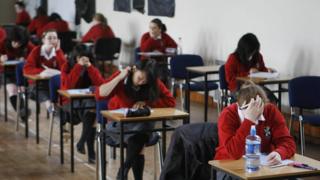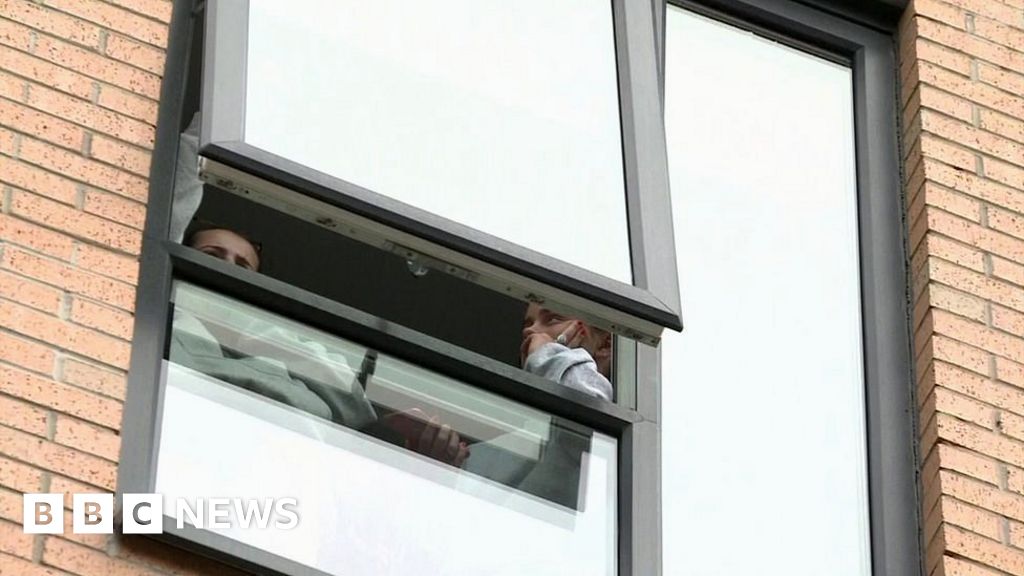 Image copyright
PA Media
Image caption
Students will be able to choose one topic to drop in subjects such as English literature
Image copyright
PA Media
Image caption
Students will be able to choose one topic to drop in subjects such as English literature
GCSE students in England will be able to drop subject areas in history and English literature exams next year.
It follows concern that schools may not be able to cover all the topics after teaching was disrupted by the pandemic.
But head teachers said the proposal only amounted to "tinkering at the edges" when students could face "widespread ongoing disruption".
Exams watchdog Ofqual has yet to decide if 2021 exams will be delayed, to give teachers more time to prepare students.
This summer's exams were cancelled and exam boards will instead issue results based on factors such as a student's predicted grades, results in previous exams and the performance of the school in previous years.
About 138,000 students in Scotland are the first in the UK to receive grades calculated in this way, for their Nationals, Highers and Advanced Higher courses.
Having originally proposed that there would be no changes to the English literature exam in 2021, Ofqual said it had decided to offer students a choice of topics after "significant concern" was expressed by schools about their ability to cover all of the subject areas that form the basis of exam questions.
Nearly half of people who respondent to a consultation opposed plans to leave the exam unchanged, saying it was hard for students "to get to grips with complex literary texts remotely".
The government has agreed students will be given a choice of topics on which they will be asked questions, so schools can focus on a smaller number of texts.
All students will have to write about a Shakespeare play, but they can choose two out of the three remaining content areas: poetry, the 19th Century novel and post-1914 British fiction and drama.
'Extremely challenging'
A similar choice of topics will be available in GCSE history and ancient history to allow schools more choice over the content they teach, Ofqual confirmed.
The exam regulator had also considered delaying the start of the GCSE exam season to 7 June instead of mid-May, but said it is still considering the best approach.
Exam season generally finishes a few weeks before the end of the school term, so there is room for manoeuvre at that stage of the year.
But Ofqual said that while there was some support for doing this to provide an extra couple of weeks of teaching time, there was concern about the knock-on effect it would have on the marking process.
At the moment, GCSE results day in England happens in the latter half of August each year.
If it was pushed any later, it would risk running into the start of the new academic year when many of those GCSE students would be planning to start A-levels or vocational qualifications - but may need to know their results so they can decide on the best path for them.
But the changes to exams "amount only to tinkering at the edges when it is clear that students could experience widespread ongoing disruption over the course of the next academic year," said Duncan Baldwin, deputy director of policy at the Association of School and College Leaders.
"Everybody can see that the situation with coronavirus remains precarious," he said, adding that schools may partially close in response to local outbreaks over the next year and students may need to self-isolate.
That meant it would be "extremely challenging" to teach all the content for GCSEs and A-levels "on top of the disruption that has already taken place", Mr Baldwin said.
Paul Whiteman, general secretary of the school leaders' union NAHT, said the plans are "too little, too late" and did not do enough to support young people's wellbeing and mental health.
"Instead, schools and students are now being left in the unenviable position that they will be expected to cover as much content as possible in a reduced amount of time. This is unfair on students and it is unfair on schools and colleges," he said.

 5 years ago
890
5 years ago
890 
